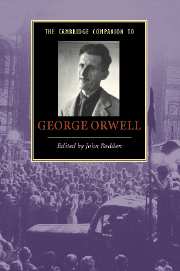Book contents
- Frontmatter
- 1 A political writer
- 2 Orwell and the biographers
- 3 Englands His Englands
- 4 The truths of experience: Orwell’s nonfiction of the 1930s
- 5 The fictional realist: novels of the 1930s
- 6 Orwell’s essays as a literary experience
- 7 ‘My country, right or left’: Orwell’s patriotism
- 8 Orwell and the British Left
- 9 Orwell, anti-Semitism and the Holocaust
- 10 Orwell, Socialism and the Cold War
- 11 Animal Farm: history as fable
- 12 Nineteen Eighty-Four: context and controversy
- 13 Orwell, the academy and the intellectuals
- 14 Orwell for today’s reader: an open letter
- 15 George Orwell: a bibliographic essay
- 16 Why Orwell still matters
- Further reading
- Index
7 - ‘My country, right or left’: Orwell’s patriotism
Published online by Cambridge University Press: 28 July 2007
- Frontmatter
- 1 A political writer
- 2 Orwell and the biographers
- 3 Englands His Englands
- 4 The truths of experience: Orwell’s nonfiction of the 1930s
- 5 The fictional realist: novels of the 1930s
- 6 Orwell’s essays as a literary experience
- 7 ‘My country, right or left’: Orwell’s patriotism
- 8 Orwell and the British Left
- 9 Orwell, anti-Semitism and the Holocaust
- 10 Orwell, Socialism and the Cold War
- 11 Animal Farm: history as fable
- 12 Nineteen Eighty-Four: context and controversy
- 13 Orwell, the academy and the intellectuals
- 14 Orwell for today’s reader: an open letter
- 15 George Orwell: a bibliographic essay
- 16 Why Orwell still matters
- Further reading
- Index
Summary
A Revolutionary in Love With the Past
It is a commonplace observation to say that George Orwell was something of a paradox. A product of the lower upper middle class (he was precise about such matters) who admired the working classes, he also was a socialist who savaged his fellow leftists for their inconsistencies. Most interestingly, Orwell was an internationalist while at the same time a fervent patriot.
Orwell's critical sense of patriotism sets him apart from the generation of English radicals of the 1930s and 1940s, most of whom were Marxists of various stripes. It was his patriotism that inspired Orwell in the grim early days of the Second World War when Great Britain seemed on the brink of invasion and defeat. His patriotism was instinctive, not the result of some philosophical analysis and because of that, it enabled him to reach beyond left wing circles to a wider audience.
In developing his ideas on patriotism Orwell made a major contribution to English thought. In his key writings between 1940 and 1942 'My Country, Right or Left' and especially The Lion and the Unicorn Orwell helped rescue the concept of patriotism from the ash heap of history where it had lain since the First World War.
- Type
- Chapter
- Information
- The Cambridge Companion to George Orwell , pp. 87 - 99Publisher: Cambridge University PressPrint publication year: 2007
- 2
- Cited by

